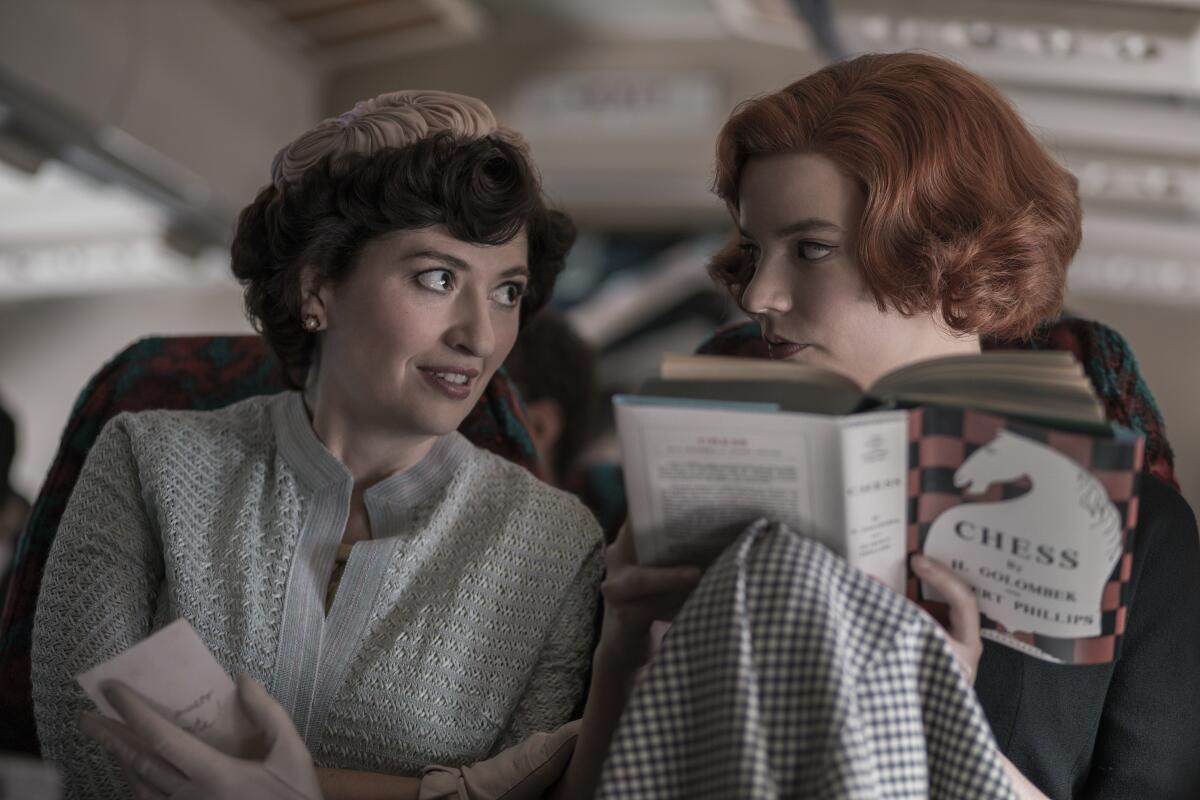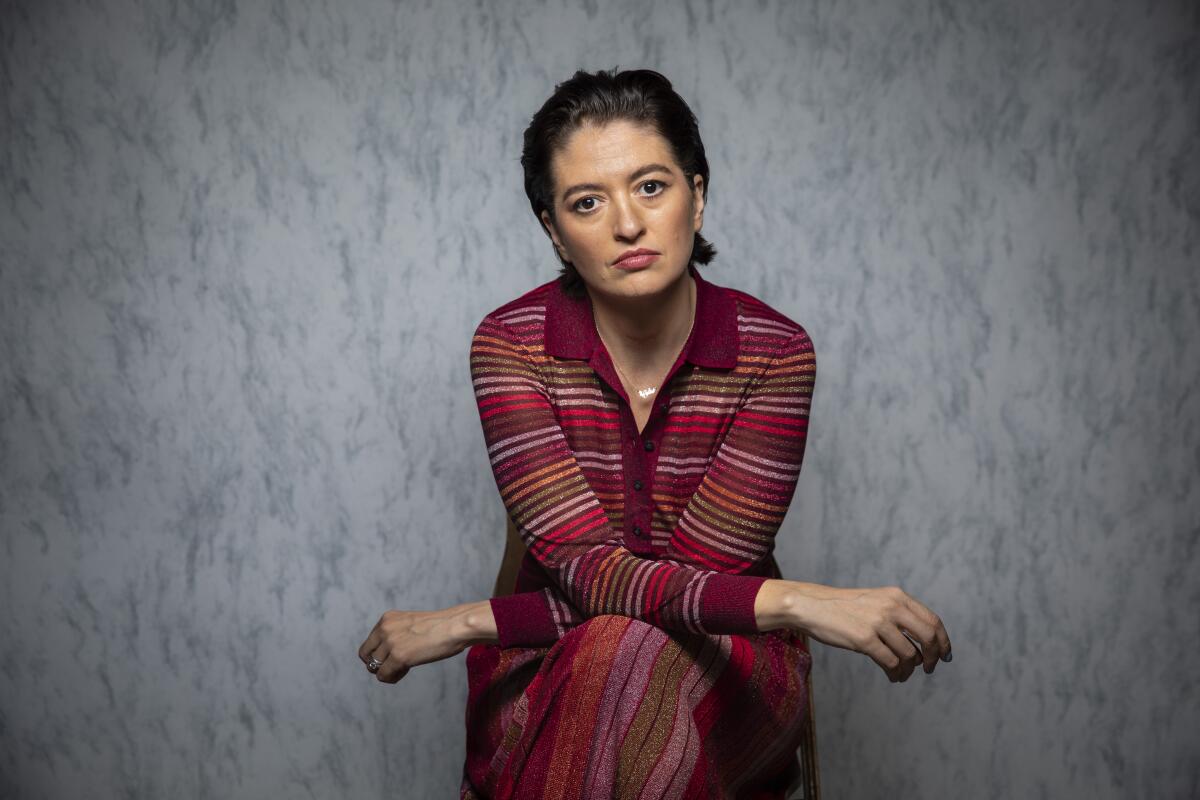Director Marielle Heller had no intention of acting again. Then came ‘Queen’s Gambit’

In the knockout Netflix series “The Queen’s Gambit,” young orphan Beth Harmon falls in love with chess — and the tranquilizers that help fuel her mastery of it. When Beth is a young teenager (played by Anya Taylor-Joy), Mrs. Alma Wheatley comes into her life, adopting the girl in a tremulous effort to save her marriage. The marriage crumbles, but the relationship between Beth and Alma comes to enrich them both. Marielle Heller is a wonder as Alma, giving her a dimmed radiance born of sorrow and bathed in alcohol.
Heller, an acclaimed director, took a circuitous route to acting. She gave up on it for 10 years. Fresh out of drama school, where she had been plied with classical roles, Heller found herself auditioning for roles such as “rape victim” in TV procedurals. “It started to get depressing,” she said, “and wasn’t feeling like it was the creative life of my dreams, so I started writing out of a desire to see more interesting characters played by young women.”
She adapted Phoebe Gloeckner’s graphic novel, “The Diary of a Teenage Girl,” directing the 2015 film. She then directed 2018’s “Can You Ever Forgive Me?” and 2019’s “A Beautiful Day in the Neighborhood.” And she didn’t look back at the acting career she left behind.
Except once.
After attending a Broadway show starring someone who gave what Heller thought was a poor performance, she felt blue. Her husband, comedian-writer-director Jorma Taccone, asked her what was wrong. “I said, ‘I guess I’m a little sad that I’m never going to act again. I feel good about my career but I never really got to fulfill that dream.’”
Back when Heller was developing “Teenage Girl” at the Sundance labs, one of her advisors was director Scott Frank. They quickly became friends, and Frank, a fan of what he called her “great, beautiful, old-fashioned face,” cast her in a tiny role in his film “A Walk Among the Tombstones.” Heller told him during filming that he’d end up cutting the scene, and she was right. Frank has tried to cast her in his projects ever since.
He finally got her to agree to play Beth’s biological mother in “Queen’s Gambit,” a role that required only four days of shooting. But when the actor initially cast as Alma dropped out, Frank offered Heller the role. She said no, insisting it was impractical to uproot her family to Berlin for three months. Then her husband reminded her of that sad Broadway conversation. “He was like, ‘You said you were never going to act again. And look, it’s here! You can’t say no.’” She agreed.

Heller did her best to be the actor she wants on her sets. “I tried to be inquisitive but follow Scott’s lead and just go with whatever he threw at me at any moment,” she says. “So when he said, ‘We’ll get you a piano teacher,’ I was like, ‘OK.’ When he said, ‘We want to cut off all your hair,’ I was like, ‘OK.’” When, due to a scheduling snafu, he asked her to take the next flight to Berlin that evening, a week earlier than planned, Heller headed to the airport.
Once on set, she was newly aware of the larger film machine at work. “As an actor, you think it’s all about what you’re doing and what you’re bringing to the table, when the truth is there’s a huge glacier under the water that is the work of the writer, the director, all of the designers, all of the PAs, everybody in all the departments who’ve come together to make you look really good. You get to be the face of it but all the work is there; you just have to not screw it up in that last minute. If I hadn’t directed three movies before I did this part, I couldn’t have had that perspective.”
She found giving up the reins “a delight.” “It’s like watching somebody else’s kid have a tantrum on the subway,” says the Brooklyn resident. “You’re like, ‘Ha! Not my problem.’ That’s how I felt every day on set,” even though she had to arrive at 4 a.m. and get under a dryer with pin curls for two hours every day. “That made me feel like a woman in the 1950s right away.” Next came all the period-correct garments, complete with girdle. “I felt so held and constricted, it gave me this physical sense that was really helpful in terms of finding her character.”
Making the emotional connection was even easier. Alma had wanted to be a pianist, but life intervened. “I could understand the pain of a woman who couldn’t fulfill her creative dreams and how awful that would feel,” Heller says. Watching Beth relentlessly pursue her own goal sparks Alma’s soul back to fitful life.
Heller and Taylor-Joy felt protective of their characters’ spiky relationship, which is navigated and re-navigated almost constantly. “That’s the beauty of Scott’s writing,” Heller says. “Every scene was so complicated, and moment to moment you felt like there were a lot of things to play, to get them all in there. I’ve had a few friends from acting school reach out to me and go, ‘Man, I don’t get to see people act the way you acted on this show — you were making weird choices.’ I’m like, ‘Is this a compliment?’”
When the show became a surprise hit, Heller realized, belatedly, that she was secretly terrified the actors she had directed wouldn’t think much of her acting. “I thought, ‘Oh God, I hope I don’t lose all my street cred,’” comparing the sensation to “seeing your teacher out at a bar.” But the responses assuaged her fears. In particular, “Chris Cooper wrote me a little love letter about my performance, and it meant the world to me, because he’s one of the best actors I’ve ever directed.”
As fulfilling as the experience was, Heller demurs when asked if she’s going to continue acting. “I don’t know, I’m a little spoiled.
This was too good of a part, with too good of a director, in too good of a series. How does that happen again?”
More to Read
From the Oscars to the Emmys.
Get the Envelope newsletter for exclusive awards season coverage, behind-the-scenes stories from the Envelope podcast and columnist Glenn Whipp’s must-read analysis.
You may occasionally receive promotional content from the Los Angeles Times.










